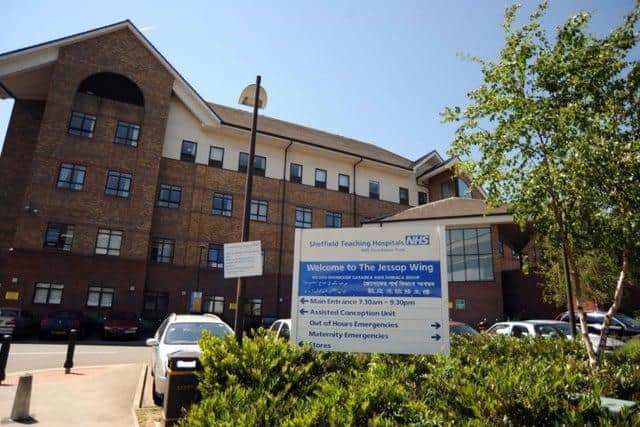Heartbroken parents whose baby died at Sheffield's Jessop Wing speak out after 'neglect' ruling at inquest
and live on Freeview channel 276
Millie-Rae Needham was born at Sheffield Teaching Hospital's Jessop Wing on August 6, 2020 at 1.56am and sadly died at the antenatal unit at 10.30pm on August 9, 2020.
She was Skinna Beckingham's second child after 10 years and her mother had had a healthy pregnancy.
Advertisement
Hide AdAdvertisement
Hide AdAn inquest at Sheffield Coroner's Court concluded on Thursday (February 17) that ‘neglect’ contributed to her death as there was a 23-minute delay in her delivery, after her heartbeat could not be located.


Assistant Coroner Abigail Combes said the baby's condition was 'not adequately monitored' and blamed this on 'individual failings'.
The court heard from consultant neonatologist Dr Porus Bustani that Millie Rae was a 'healthy infant and would have been born in a healthy condition' had there been no delay.
He suggested that the suspicion which he and his colleagues had was that whilst the baby was at the perineum at the time of delivery, there was a compression of her umbilical cord that was over her shoulder within the birth canal.


No progress despite positional changes
Advertisement
Hide AdAdvertisement
Hide AdThe inquest also heard that when Skinna entered the second stage of labour for 25 minutes, there was no demonstrable progress despite positional changes.
The midwife who assisted Skinna then requested a more senior assistant and raised her concern that an episiotomy - a procedure done to make vaginal opening larger for childbirth - may be required.
The support came two minutes later at 1.27am but it was a midwife of a similar seniority to the one supporting Skinna in the labour.
They both then discussed further position changes, leading to a two-minute delay in the next recording of Millie-Rae's heartbeat.
Advertisement
Hide AdAdvertisement
Hide AdHowever, Asst Coroner Combes said her heartbeat, at this point, was heard at 150 beats per minute with accelerations.
A more senior midwife eventually attended the room at 1.50am, and by then it was clear then an episiotomy was needed.
Milie-Rae born ‘pale and floppy’
The inquest heard that the procedure was performed at 1.55am and Millie-Rae was born at 1.56am in 'poor condition' where she appeared 'pale and floppy' and was making no respiratory effort.
The neonatal team arrived a further four minutes later and noted that Millie-Rae’s heart rate had become undetectable and a consultant during the crash team and cardiopulmonary resuscitation with chest compressions was also present.
Advertisement
Hide AdAdvertisement
Hide AdAfter 10 minutes, Millie-Rae's heart rate returned to between 60 and 100 beats per minute and over 100 beats per minute after one minute.
The baby was then transferred to the neonatal unit, where despite the efforts of the neonatal team, she died at 10.35pm on August 9.
The post-mortem examination concluded that her cause of death was a hypoxic ischemic encephalopathy where the brain doesn't receive enough oxygen or blood flow.
Concluding the inquest, Asst Coroner Combes said despite the first midwife recognising the need for more urgent intervention, it still had 'not generated actions to safeguard her from harm’.
Advertisement
Hide AdAdvertisement
Hide AdShe said: "This failure was not a complex medical decision. It was also a continuing failure from 1.33am until a second call for senior intervention at 1.48am
"During this time there were a number of clinical decisions made none of which included adequate risk escalation and none of which resulted in a positive outcome either for Millie-Rae or for Skinna.
"This failure to provide basic monitoring and basic action to expedite delivery amounts to a gross failure of care."
She added: “I am satisfied on the basis of evidence and on the balance of probabilities that Millie-Rae’s death was contributed to by neglect.”
Advertisement
Hide AdAdvertisement
Hide AdShe also offered her condolences to Millie-Rae's parents, Skinna and Ryan Needham, who were present during the inquest.
Representatives from Sheffield Teaching Hospitals were also present and said they would assist the coroner’s court in providing evidence in regards to midwives’ training on episiotomy.
Millie-Rae’s parents: ‘This is something we will never be able to get over’
In a statement following the inquest, Skinna and Ryan said Millie-Rae’s death has had a ‘lasting profound impact’ on their lives.
They said: “This is something that we will never be able to get over. We would, however, like to thank the coroner as we are grateful for the opportunity to have had our concerns heard and questions explored through the inquest process.
Advertisement
Hide AdAdvertisement
Hide Ad“Our main aim throughout this whole difficult and harrowing process has been to ensure that lessons are learned and no other family has to go through the pain that we have and are continuing to experience. We truly hope meaningful change happens.”
Helen Rundle, medical negligence associate, and Kiran Pahal, medical negligence solicitor, both of Lime Solicitors, have assisted the family in preparation for Millie-Rae Needham’s inquest.
They said: “It has been absolutely devastating for all those involved to hear that serious failings occurred during Skinna’s labour and without such failings, things would have been very different for the family. The seriousness of the failings are highlighted by the fact the coroner has made a finding of neglect.
"In order to make this finding, the coroner has to be satisfied that there has been a gross failure to provide basic medical care. This finding should not be taken lightly by the hospital trust.
Advertisement
Hide AdAdvertisement
Hide Ad“We echo the sentiments of Ryan and Skinna in that we hope the hospital trust and those involved in Skinna’s care reflect on the tragedy of this case and implement changes to prevent other parents experiencing the same.”

